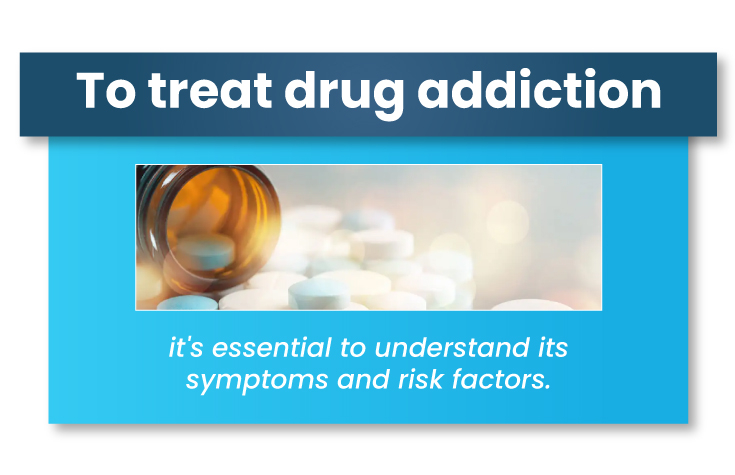Alcohol addiction is a chronic illness that significantly alters a person’s behavior and how their brain works. It is defined as a propensity to misuse a substance even though doing so has serious adverse effects. Evidence-based behavioral therapies and, in some situations, medicines can successfully treat and control addiction. Alternative treatments are used in some recovery facilities to treat addiction.
When a person uses or abuses drugs or alcohol and eventually loses the ability to manage their usage, it can have a detrimental impact on their personal, professional, educational, and family lives. This loss of control is frequently fueled by the body’s tolerance and physical reliance on repeated substance exposure. The condition of addiction impacts both the brain and behavior.
Key Takeaways
Drug addiction harms overall health and can even cause the death of your loved one. This blog post entails the following findings:
- Addiction is a chronic mental disease that can have severe consequences if ignored.
- To treat drug addiction, it’s essential to understand its symptoms and risk factors.
- Multiple treatment programs can help treat drug addiction withdrawal symptoms effectively.
Seek quality help at The Haven Detox New England. Contact us at (844) 933-4145 to learn more about our treatment programs and service charges.

First, Understand The Symptoms of Drug Addiction
You first need to be aware of the complexity of the challenges associated with quitting substance usage. Alcohol and drug abuse alter the brain’s self-control-related regions.
It becomes more challenging to stop or otherwise control compulsive substance use as a person continues to use drugs or alcohol because certain parts of the brain change how they function.
It’s also crucial to realize that you probably won’t be able to convince them to stop using drugs by yourself. However, by encouraging their desire to change, loved ones of drug users can aid in their recovery.
Your loved one can start along the road to sobriety by being encouraged to get professional help for their addiction. This will help them stop abusing drugs and alcohol. Recovery is achievable whether you’re looking for support for alcohol, cocaine, marijuana, heroin, crystal methamphetamine, or any other addiction.
- Problems in school, a lack of enthusiasm for activities related to learning, and deteriorating grades
- Subpar job output, regular tardiness, drowsiness, and indifference to tasks, as well as negative performance evaluations
- A change in one’s physical appearance, such as dressing improperly or in filthy clothes or showing little concern in grooming
- A noticeable lack of energy when carrying out everyday tasks. Spending more money than usual or asking for loans. Modified conduct, such as an increased desire for privacy. Dramatic changes in relationships.
- Changes in appetite, like a decreased appetite and related weight loss
- Problems with money management, such as failing to pay payments on time
- Tired or run-down appearance, with bloodshot eyes and uneven skin tone.
- Defiant attitude when asked about drug use
Examine Drug Addiction Risk Factors
Examine your family’s history of addiction and mental illness. Several studies have shown that these conditions tend to run in families, but they can be avoided. Your chances of overcoming your biological, environmental, and physical risk factors increase as you become more aware of them.
Think for A Change
Monitor your drug use, including the quantity and frequency of your service. This will help you understand the part that your addiction is playing in your life.
- Make a list of the advantages and disadvantages of quitting and the expenses and gains from continuing your drug usage.
- Take into account your partner, children, pets, work, health, and other things that are essential to you. What impact does your drug use have on those things?
- Discover the thoughts of a person you trust regarding your drug use.
- Consider what might be holding you back from making a change. What could aid in your transition?
Seek Professional Assistance
Substance misuse and mental disorders frequently coexist. You should get professional assistance from a qualified therapist or counselor if you struggle with a mental ailment like anxiety, depression, or post-traumatic stress disorder.
A professional can teach you effective coping mechanisms so you may manage your symptoms without abusing alcohol or drugs.
Find Effective Drug Addiction Treatment Programs
In case you and your family member are experiencing drug or alcohol addiction, following treatment options can help you to get back to an alcohol-free life.
Inpatient Treatment Program
Residential or inpatient therapy can also be successful, especially for those with more severe issues (including co-occurring disorders). Licensed residential treatment centers provide intense care structured 24 hours a day, safe housing, and medical attention.
Residential treatment centers may employ a range of therapeutic techniques and typically strive to assist patients in leading drug- and crime-free lives after treatment. Residential treatment facilities include, for instance:
Detoxification Treatment Program
Detoxification aids in a safe withdrawal from drugs or alcohol until the substances are completely gone from the body. When someone is recovering from a moderate to severe addiction, this is frequently the initial stage in their treatment.
When detoxing from some drugs, medication-assisted therapy may be necessary to reduce the severity of withdrawal signs. When a patient is no longer physiologically dependent on addictive substances, medications recommended during detox are frequently tapered down.
Addiction Treatment Medications
Patients may be given drugs to aid their recovery throughout detox and therapy. These drugs are employed for several goals, such as controlling cravings, easing withdrawal symptoms, or treating co-occurring illnesses.
The best benefits from medications for addiction therapy come from using them in conjunction with an extensive treatment plan.
Partial Hospitalization Program
People who need constant medical monitoring but still want to remain at home and have a stable living environment can consider partial hospitalization. These therapy programs often meet for 7 to 8 hours during the day at a treatment facility, after which you go home at night.
Outpatient Treatment Program
These outpatient programs can be planned around work or school because they are not live-in treatment programs. You don’t stay overnight; treatment occurs during the day or evening. The avoidance of relapse is the main priority.
Residential treatment Living at a facility for medical advice and avoiding distractions like job, school, family, friends, and addiction triggers are both components of residential treatment. From a few days to several months, residential treatment is possible.
Cognitive Behavioral Therapy program
People in recovery are guided through cognitive behavioral therapy (CBT) to identify troubling thoughts or emotions that can jeopardize their sobriety or cause a relapse. Additionally, helpful in treating co-occurring disorders like bipolar disorder and this type of therapy.
Dialectical Behavior Therapy Program
Dialectical behavioral treatment (DBT) treats severe mental diseases, including obsessive-compulsive and substance use disorders. Using stress-management techniques and encouragement to get rid of triggers, this therapy seeks to boost self-esteem in those in the recovery process.
Experiential Therapy Program
Experiential therapy helps recovering addicts deal with repressed experiences and emotions that may have contributed to their addiction by using unconventional therapeutic techniques. Outdoor leisure activities like rock climbing are typical examples of this therapy.
Support Groups
A patient is strongly advised to join a support group after completing an addiction treatment program. After finishing treatment, support groups are crucial for continuing on the road to recovery and enabling long-term aftercare.
The people you meet in support groups can encourage you as you go through the healing process. There are numerous different support groups with specializations in various substances or populations. Finding the right group offers a community of people who encourage and urge one another to maintain a commitment to recovery.
12-Step Treatment Program
12-step programs are considered the gold standard for addiction recovery. These programs adhere to the 12 traditions and the 12-step recovery model that the founders of Alcoholics Anonymous developed. Many have found programmers to assist significantly in their recovery since they allow users to customize the steps to meet their requirements.
The 12-step programmer’s Alcoholics Anonymous and Narcotics Anonymous are the most well-known.
Sober Living Communities
Living in a sober house is typical following an intensive treatment program, such as residential treatment. In a secure, encouraging, and drug-free atmosphere, you share housing with other addicts in recovery.
If you don’t know where to go or are concerned that going home too soon would cause a relapse, sober living facilities can be helpful.
Frequently Asked Questions(FAQs)
What are the four ways you can help someone who is addicted to drugs?
Below are a few effective ways to help someone who is addicted to drugs:
To help someone who is drug addicted, be clear in what you want to communicate, and don’t hesitate to bring up your feelings about the situation calmly.
Saying how you feel is often a good starting point. Tell your loved one how it hurts and worries you to see them addicted to drugs and how you fear for their safety.
Always show love, support, and trust to your loved one. Providing love and support will help a lot in quitting diction and getting back on the life track.
In case treatment is required, let the rehab process be quick and easy to achieve recovery.
What is the most effective way to treat drug addiction?
Drug addiction is a chronic illness marked by obsessive or uncontrollable drug seeking and use despite adverse effects and potentially long-lasting changes in the brain. The negative behaviors found in drug users may result from these alterations in the brain.Drug addiction is a relapsing condition as well. Relapse is the act of using drugs again after making an effort to stop. Counseling and several behavioral therapies are the most commonly used forms of treatment.
Medications are often essential to treatment, especially when combined with behavioral therapies. Treatment plans must be reviewed constantly and modified to fit the patient’s changing needs.
What is the best way to prevent addiction to drugs?
Substance abuse causes physical health problems as well as mental health issues if continued for a long time. Several studies suggest that drug addiction can be prevented by following some basic principles.
Here are the top five ways to prevent substance abuse
Get to know how substance abuse develops.
Understand the side effects of drug addiction
Avoid temptation and peer pressure
Seek help for mental illness
Examine the risk factors.
Keep a well-balanced life.
Eat healthy foods regularly
Join sober people’s community
Help others who are struggling with a substance abuse disorder
Seek Long-Term Sobriety at The Haven Detox New England
Drug addiction is dangerous and can result in negative consequences. If you and your loved one are looking for help, let The Haven Detox New England be your support in getting back to everyday life.
We offer treatment services for addiction to mental health disorders. We provide treatment programs, including a residential treatment program, medical detoxification treatment program, and multiple therapy sessions to assist people toward sobriety.
Call us at (844) 933-4145 to learn more about our treatment programs and service charges.
